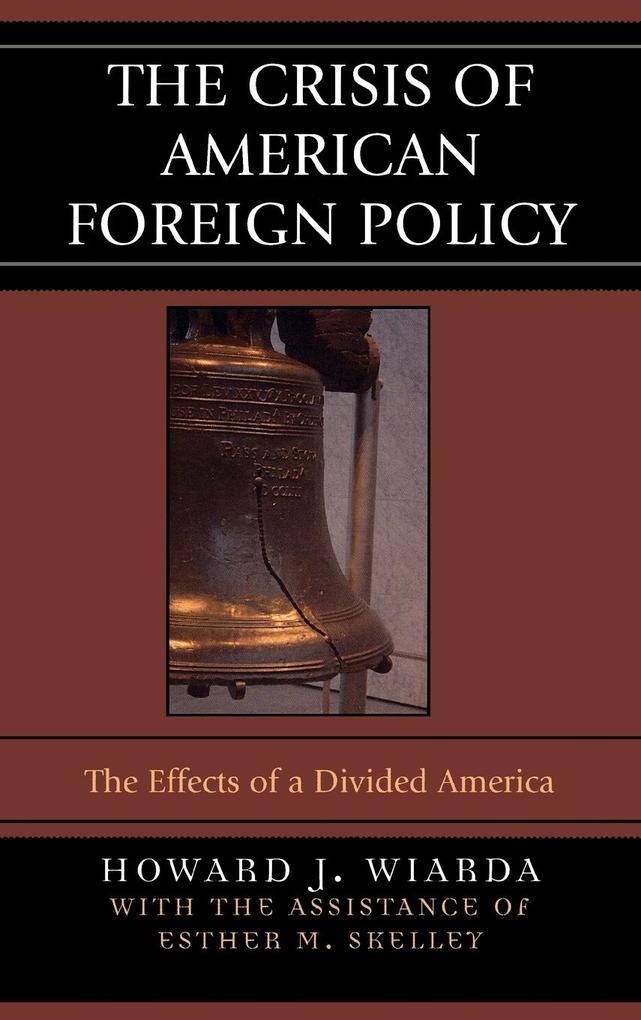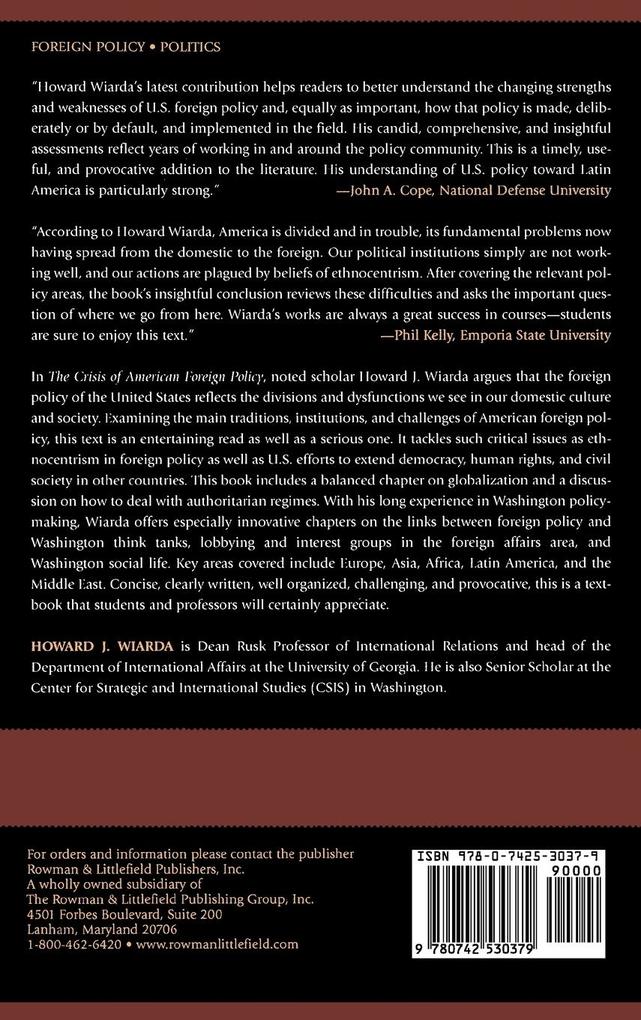
Zustellung: Mi, 16.07. - Sa, 19.07.
Versand in 7 Tagen
VersandkostenfreiIn The Crisis of American Foreign Policy, noted scholar Howard J. Wiarda argues that the foreign policy of the United States reflects the divisions and dysfunctions we see in our domestic culture and society. This text tackles such critical issues as ethnocentrism in foreign policy as well as U. S. efforts to extend democracy, human rights, and civil society in other countries. Key areas covered include Europe, Asia, Africa, Latin America, and the Middle East. Concise, clearly written, well-organized, challenging, and provocative, this is a text that students and professors alike will appreciate.
Inhaltsverzeichnis
Introduction: Rethinking American Foreign Policy
Part I: American Foreign Policy: Crisis and Change
Chapter 1: American Foreign Policy: Politics and Paralysis
Chapter 2: New Challenges in U. S. Foreign Policy
Chapter 3: The Main Institutions of Foreign Policymaking
Chapter 4: The New Powerhouses: Think Tanks and Foreign Policy
Chapter 5: The Washington Social Circuit and Foreign Policy
Part II: Hot Global Issues
Chapter 6: Ethnocentrism and Foreign Policy: Can We Understand the Third World?
Chapter 7: The Democracy Agenda in U. S. Foreign Policy
Chapter 8: Human Rights Policy
Chapter 9: Friendly Tyrants and American Interests
Chapter 10: Globalization and Its Critics
Part III: Regional Responses
Chapter 11: Asia and the Effort to Grow Civil Society
Chapter 12: Democracy and Development in Sub-Saharan Africa
Chapter 13: Benign Neglect: American Foreign Policy in Latin America in the Post-Cold War Era
Chapter 14: The Middle East and Islamic Society
Conclusion
Suggested Readings
Part I: American Foreign Policy: Crisis and Change
Chapter 1: American Foreign Policy: Politics and Paralysis
Chapter 2: New Challenges in U. S. Foreign Policy
Chapter 3: The Main Institutions of Foreign Policymaking
Chapter 4: The New Powerhouses: Think Tanks and Foreign Policy
Chapter 5: The Washington Social Circuit and Foreign Policy
Part II: Hot Global Issues
Chapter 6: Ethnocentrism and Foreign Policy: Can We Understand the Third World?
Chapter 7: The Democracy Agenda in U. S. Foreign Policy
Chapter 8: Human Rights Policy
Chapter 9: Friendly Tyrants and American Interests
Chapter 10: Globalization and Its Critics
Part III: Regional Responses
Chapter 11: Asia and the Effort to Grow Civil Society
Chapter 12: Democracy and Development in Sub-Saharan Africa
Chapter 13: Benign Neglect: American Foreign Policy in Latin America in the Post-Cold War Era
Chapter 14: The Middle East and Islamic Society
Conclusion
Suggested Readings
Produktdetails
Erscheinungsdatum
20. Oktober 2006
Sprache
englisch
Seitenanzahl
344
Autor/Autorin
Howard J. Wiarda
Verlag/Hersteller
Produktart
gebunden
Gewicht
710 g
Größe (L/B/H)
235/157/25 mm
ISBN
9780742530379
Entdecken Sie mehr
Pressestimmen
Howard Wiarda's latest contribution helps readers to better understand the changing strengths and weaknesses of U.S. foreign policy and, equally as important, how that policy is made, deliberately or by default, and implemented in the field. His candid, comprehensive, and insightful assessments reflect years working in and around the policy community. This is a timely, useful, and provocative addition to the literature. His understanding of U.S. policy toward Latin America is particularly strong. -- John A. Cope, National Defense University Upper-year undergraduates or those headed to Washington for the first time for an internship would benefit from Wiarda's clear writing style and insights. International Affairs, March 2008 According to Howard Wiarda, America is divided and in trouble, its fundamental problems now having spread from the domestic to the foreign. Our political institutions simply are not working well, and our actions are plagued by beliefs of ethnocentrism. After covering the relevant policy areas, the book's insightful conclusion reviews these difficulties and asks the important question of where we go from here. Wiarda's works are always a great success in courses-students are sure to enjoy this text. -- Phil Kelly, Emporia State University
Bewertungen
0 Bewertungen
Es wurden noch keine Bewertungen abgegeben. Schreiben Sie die erste Bewertung zu "Crisis of American Foreign Policy" und helfen Sie damit anderen bei der Kaufentscheidung.








